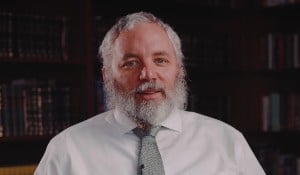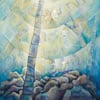
Our patriarchs, Abraham, Isaac and Jacob established a rite of prayer that is followed to this very day. Abraham composed the morning service ("Shacharit"), Isaac the afternoon service ("Minchah") , and Jacob the evening service ("Maariv").1
In prayer we draw divine energy into our environment and ourselves. Since each day progresses through three stages — morning, afternoon and evening — it is necessary to pray three times every day. Each prayer is designed a little differently from the others in order to draw on the specific form of energy required at that stage. Each prayer was instituted specifically by the patriarch whose spiritual character was aligned with the particular form of energy associated with that prayer.2
Three Stages
The first stage of the day occurs as dawn breaks. This moment is filled with promise, the excitement of potential is in the air. The divine energy that is required at this time is that of optimism. Abraham, a man of positive spirit and infinite optimism, accordingly coined the Shacharit prayer.
As the day advances, the morning's enthusiasm winds down and we engage in the difficult yet rewarding task of achievement. We face our challenges and plow through them, intent on achieving our goals by the end of the day. The energy that is required at this time is that of resolve. Isaac, a man of dedication, commitment and somber resolve, accordingly composed the Minchah prayer.
As the day wanes, we wrap up our activities and wearily sit back to reflect. Though the day has been successful we realize that there is yet so much to achieve. We wanted to complete the task but darkness has encroached.
The night grows melancholy. We sense the mortality of the human condition as we realize that daylight and warmth don't last forever. The morning's enthusiasm and the afternoon's momentum have waned, and the night envelops us in a dark and brooding despair. Can we overcome the chill of the night and draw into it the warmth of G‑d?
The answer is a resounding yes and our patriarch Jacob authored the prayer for it. Why Jacob? Jacob personified the steadfast commitment of divine truth that never wanes despite the conditions. His life was a string of dark moments, difficult trials and overwhelming challenges; but through it all he never despaired. When he dipped into his valleys he had eyes only for the distant peaks; when the horizon looked bleak he was filled with forward momentum.
Inner Space
Let us examine what the Torah says of Jacob. He was forced to leave the bosom of his family, the guidance of his teachers, the support of his colleagues and friends. He wandered to a strange land and entered a foreign culture. He plunged into his night with what should have been a heavy heart.
The Torah reports, "Vayeitzei Yaakov — and Jacob departed...." In his mind he felt that this was going to be a total and complete departure. He left thinking that he would never return, convinced that he would need to make a new life for himself in a strange a foreign land, that he was setting out for an exile that would last his entire life.3
As the sun set on his first day of travel the Torah tells us that "he encountered the place" where the Temple was later built. What did he do at that space? He composed the evening service.
Consider his situation. Banished from home, estranged from family, alone in the dark — and he is not afraid. On the contrary he is inspired. What is the source of this amazing strength of character?
The answer lies in the choice of terminology the Torah employs: "Vayifga bamakom ki ba hashemesh..." These words are ordinarily translated as "he encountered the place as the sun set." However, a literal translation of the words yield a different meaning: "he encountered the inside of the place because the sun set." When he saw that night fell as soon as he arrived to the Temple Mount, he came to understand the inner rhythm, the heart and soul, of this holy space.4
Light within the Dark
Our sages teach that the Temple Mount is suffused with metaphysical light that far transcends, and in fact acts as the source of, conventional light. As Jacob approached and experienced the metaphysical light, the sun immediately set. Because conventional light is overshadowed when it encounters the temple's light.5
The ordinary person would have only experienced the fading of the conventional light. But Jacob was alert to the "inside," the inner meaning, of this space. He understood that the essence of this dark was shrouded in a rarefied light so G‑dly as to lie beyond the perception of the human eye.6
Night did fall, but Jacob was not gripped by chilling melancholy but by inspiration and joy. He saw this as the perfect time to coin a prayer of gratitude to G‑d for having given to him, and through him to us, a gift called night.7
He pierced the veil of darkness and discovered the transcendent light that lies beneath. He revealed that night is not the end of today but the beginning of tomorrow. Indeed, the rest and relaxation of the night refreshes us and enables us to face the light of morning.
With this prayer, Jacob enabled us to draw divine energy into the weary and demoralizing night. With this prayer, we prevent the night from shattering yesterday's glorious dream. With this prayer, we greet tomorrow's dawn because it gives us courage to face tonight's dark.8







Join the Discussion